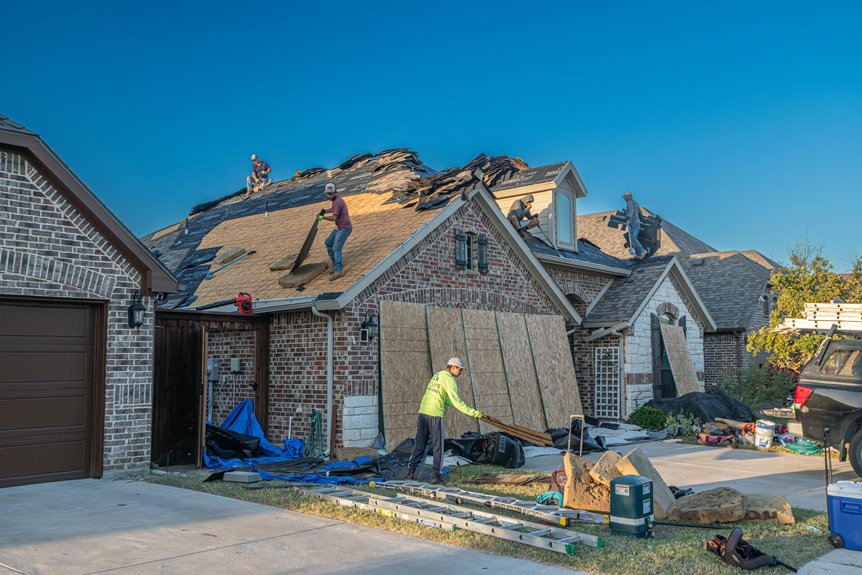If you’re considering replacing your roof, you might be eligible for tax deductions or credits that can help offset the costs. Certain improvements, especially those that boost energy efficiency or safety, qualify under specific IRS guidelines. Knowing which upgrades qualify and how to document them properly can make a significant difference come tax time. Understanding these options could save you money—so it’s worth exploring what benefits you might claim for your roof replacement project.
Understanding Home Improvement Tax Deductions
Understanding home improvement tax deductions can save you money by reducing your taxable income. When you invest in roofing materials for your roof replacement, you might qualify for certain deductions, especially if the project improves your home’s structure or safety.
Additionally, contractor incentives can play a role; some contractors offer discounts or rebates that could be considered part of your deductible expenses. Keep records of receipts and contracts to support your claims.
While most home improvements aren’t directly tax-deductible, specific upgrades like repairs that qualify as improvements or renovations may be. Consulting a tax professional helps you identify eligible deductions, ensuring you maximize savings while staying compliant with IRS rules.
Energy Efficiency Incentives for Roofing Projects
Energy efficiency incentives can substantially offset the costs of roofing projects that improve your home’s energy performance. You might qualify for solar rebates if you install solar-powered roofing systems, reducing your upfront expenses.
Additionally, insulation grants are available to help fund upgrades that enhance your roof’s insulation, lowering heating and cooling costs. These incentives encourage you to invest in energy-efficient materials and technologies, making your roof more sustainable and cost-effective over time.
By taking advantage of these programs, you can maximize savings while increasing your home’s energy resilience. Be sure to check local and federal programs, as eligibility criteria vary. Customer satisfaction is a key focus of Top View Roofing, ensuring you receive quality service throughout your project.
Leveraging solar rebates and insulation grants not only benefits your wallet but also supports environmentally friendly home improvements.
Residential Energy Credits and How They Apply
Residential energy credits can considerably reduce your tax liability when you make qualifying upgrades to your home’s energy systems. These credits often include incentives like solar panel incentives, which help offset the cost of installing renewable energy sources.
Additionally, insulation rebates are available for improving your home’s thermal efficiency, making it more energy-efficient and eco-friendly. To qualify, your upgrades must meet specific standards set by the IRS, such as energy-saving certifications.
Claiming these credits can significantly lower your tax bill while encouraging sustainable home improvements. Keep detailed records of your purchases and installation dates.
The Role of Property Improvements in Tax Benefits
Property improvements can play a significant role in maximizing your tax benefits, especially when they enhance your home’s value and energy efficiency. When you invest in upgrades like a roof replacement, the material costs and contractor fees are key factors to contemplate.
These expenses may qualify for deductions or credits, depending on current tax laws. Properly tracking your receipts for materials purchased and contractor invoices ensures you can substantiate your claims.
Additionally, some improvements might be classified as capital expenses, potentially allowing you to depreciate the costs over time. Upgrades that improve energy efficiency, such as installing reflective coatings or better insulation, can also qualify for specific credits.
Qualifications and Documentation for Tax Deductions
To qualify for tax deductions related to roof replacement expenses, you need to meet specific criteria set by the IRS and maintain thorough documentation.
First, ensure your roofing materials qualify as deductible improvements, such as energy-efficient roofing options.
When selecting a contractor, choose a licensed professional who provides detailed invoices outlining the scope of work, roofing materials used, and costs.
Keep all receipts, contracts, and payment records organized, as they serve as proof of your expenses.
It’s also important to document the date of the roof replacement and confirm that the project was completed as agreed.
Proper documentation and a clear record of roofing materials and contractor selection help substantiate your claim, making it easier to justify your deduction during tax filing.
Tips for Maximizing Your Tax Savings on Roof Replacements
Maximizing your tax savings on roof replacements starts with understanding available credits and deductions. If your roof was damaged by hail, you might qualify for tax deductions or credits, especially if you file insurance claims.
Keep detailed records of the damage, repair costs, and insurance reimbursements to substantiate your claim. Timing matters—if you replace your roof within the tax year, you can often deduct the costs or apply credits accordingly.
Consult IRS guidelines to determine whether the work qualifies as a capital improvement or repair. Additionally, explore any local or federal incentives for weather-related damage.
Proper documentation and strategic planning guarantee you get the maximum benefit, reducing your overall tax liability while restoring your roof efficiently.
Conclusion
By understanding the available tax deductions and credits for roof replacements, you can save money while improving your home’s energy efficiency and safety. Make certain to choose qualifying materials, keep detailed records, and consult a tax professional to maximize your benefits. Taking these steps ensures you get the most out of your investment and stay compliant with IRS regulations. Don’t overlook these opportunities to make your roof upgrade more affordable. For more information on how to schedule your free roof inspection, call us at (405) 543-2920 or visit us online at Top View Roofing.


















